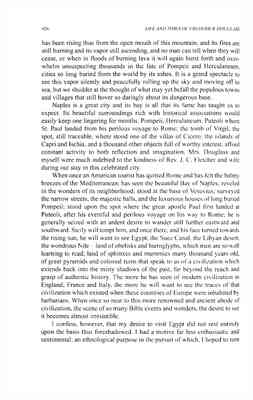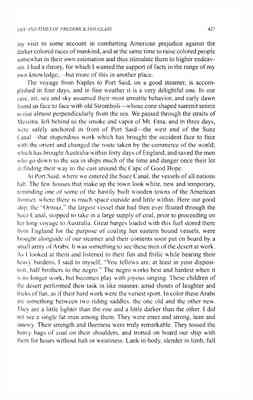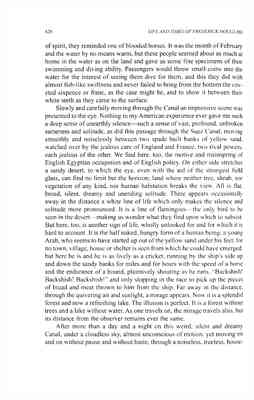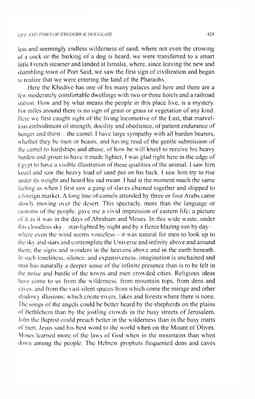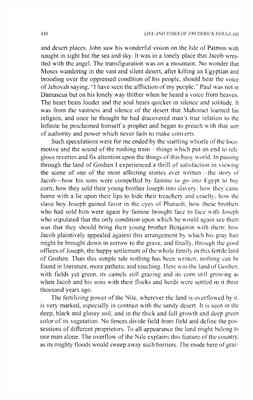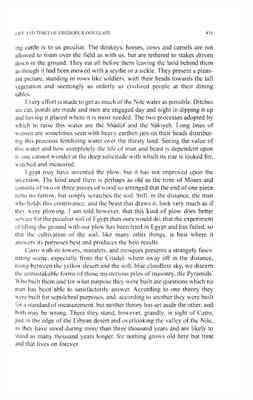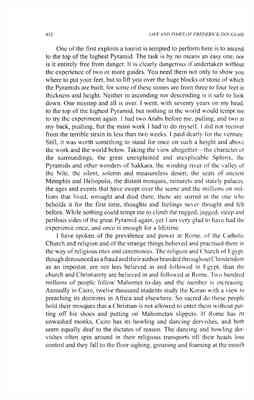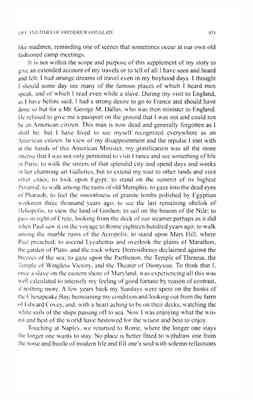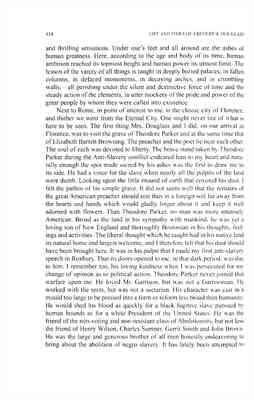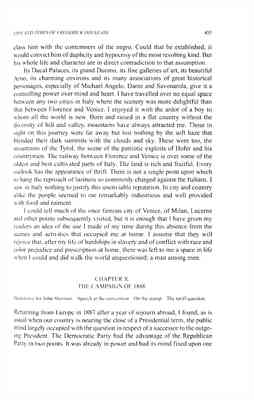Pages That Need Review
Life and Times, Third Part
52
426 LIFE AND TIMES OF FREDERICK DOUGLASS
has been rising thus from the open mouth of this mountain, and its fires are still burning and its vapor still ascending, and no man can tell when they will cease, or when in floods of burning lava it will again burst forth and overwhelm unsuspecting thousands in the fate of Pompeii and Herculaneum, cities so long buried from the world by its ashes. It is a grand spectacle to see this vapor silently and peacefully rolling up the sky and moving off to sea, but we shudder at the thought of what may yet befall the populous towns and villages that still hover so daringly about its dangerous base.
Naples is a great city and its bay is all that its fame has taught us to expect. Its beautiful surroundings rich with historical associations would easily keep one lingering for months. Pompeii, Herculaneum, Puteoli where St. Paul landed from his perilous voyage to Rome; the tomb of Virgil; the spot, still traceable, where stood one of the villas of Cicero; the islands of Capri and lschia, and a thousand other objects full of worthy interest, afford constant activity to both reflection and imagination. Mrs. Douglass and myself were much indebted to the kindness of Rev. J. C. Fletcher and wife during our stay in this celebrated city.
When once an American tourist has quitted Rome and has felt the balmy breezes of the Mediterranean; has seen the beautiful Bay of Naples; reveled in the wonders of its neighborhood; stood at the base of Vesuvius; surveyed the narrow streets, the majestic halls, and the luxurious houses oflong buried Pompeii; stood upon the spot where the great apostle Paul first landed at Puteoli, after his eventful and perilous voyage on his way to Rome; he is generally seized with an ardent desire to wander still further eastward and southward. Sicily will tempt him, and once there, and his face turned towards the rising sun, he will want to see Egypt, the Suez Canal, the Libyan desert, the wondrous Nile– land of obelisks and hieroglyphs, which men are so well learning to read; land of sphinxes and mummies many thousand years old, of great pyramids and colossal ruins that speak to us of a civilization which extends back into the misty shadows of the past, far beyond the reach and grasp of authentic history. The more he has seen of modern civilization in England, France and Italy, the more he will want to see the traces of that civilization which existed when these countries of Europe were inhabited by barbarians. When once so near to this more renowned and ancient abode of civilization, the scene of so many Bible events and wonders, the desire to see it becomes almost irresistible.
I confess, however, that my desire to visit Egypt did not rest entirely upon the basis thus foreshadowed. I had a motive far less enthusiastic and sentimental; an ethnological purpose in the pursuit of which, I hoped to turn
53
LIFE AND TIMES OF FREDERICK DOUGLASS 427
my visit to some account in combatting American prejudice against the darker colored races of mankind, and at the same time to raise colored people somewhat in their own estimation and thus stimulate them to higher endeavors. I had a theory, for which I wanted the support of facts in the range of my own knowledge,– but more of this in another place.
The voyage from Naples to Port Said, on a good steamer, is accomplished in four days, and in fine weather it is a very delightful one. In our case, air, sea and sky assumed their most amiable behavior, and early dawn found us face to face with old Stromboli– whose cone shaped summit seems to rise almost perpendicularly from the sea. We passed through the straits of Messina, left behind us the smoke and vapor of Mt. Etna, and in three days, were safely anchored in front of Port Said– the west end of the Suez Canal– that stupendous work which has brought the occident face to face with the orient and changed the route taken by the commerce of the world; which has brought Australia within forty days of England, and saved the men who go down to the sea in ships much of the time and danger once their lot in finding their way to the east around the Cape of Good Hope.
At Port Said, where we entered the Suez Canal, the vessels of all nations halt. The few houses that make up the town look white, new and temporary, reminding one of some of the hastily built wooden towns of the American frontier, where there is much space outside and little within. Here our good ship, the "Ormuz," the largest vessel that had then ever floated through the Suez Canal, stopped to take in a large supply of coal, prior to proceeding on her long voyage to Australia. Great barges loaded with this fuel stored there from England for the purpose of coaling her eastern bound vessels, were brought alongside of our steamer and their contents soon put on board by a small army of Arabs. It was something to see these men of the desert at work. As I looked at them and listened to their fun and frolic while bearing their heavy burdens, I said to myself, "You fellows are, at least in your disposition, half brothers to the negro." The negro works best and hardest when it is no longer work, but becomes play with joyous singing. These children of the desert performed their task in like manner, amid shouts of laughter and tncks of fun, as if their hard work were the veriest sport. In color these Arabs are something between two riding saddles, the one old and the other new. They arc a little lighter than the one and a little darker than the other. I did not see a single fat man among them. They were erect and strong, lean and sinewy. Their strength and fleetness were truly remarkable. They tossed the heavy bags of coal on their shoulders, and trotted on board our ship with them for hours without halt or weariness. Lank in body, slender in limb, full
54
428 LIFE AND TIMES OF FREDERICK DOUGLASS
of spirit, they reminded one of blooded horses. It was the month of February and the water by no means warm, but these people seemed about as much at home in the water as on the land and gave us some fine specimens of their swimming and diving ability. Passengers would throw small coins into the water for the interest of seeing them dive for them, and this they did with almost fish-like swiftness and never failed to bring from the bottom the coveted sixpence or franc, as the case might be, and to show it between their white teeth as they came to the surface.
Slowly and carefully moving through the Canal an impressive scene was presented to the eye. Nothing in my American experience ever gave me such a deep sense of unearthly silence– such a sense of vast, profound, unbroken sameness and solitude, as did this passage through the Suez Canal, moving smoothly and noiselessly between two spade built banks of yellow sand, watched over by the jealous care of England and France, two rival powers, each jealous of the other. We find here, too, the motive and mainspring of English Egyptian occupation and of English policy. On either side stretches a sandy desert, to which the eye, even with the aid of the strongest field glass, can find no limit but the horizon; land where neither tree, shrub. nor vegetation of any kind, nor human habitation breaks the view. All is flat, broad, silent, dreamy and unending solitude. There appears occasionally away in the distance a white line of life which only makes the silence and solitude more pronounced. It is a line of flamingoes– the only bird to be seen in the desert– making us wonder what they find upon which to subsist. But here, too, is another sign of life, wholly unlooked for and for which it is hard to account. It is the half naked, hungry form of a human being, a young Arab, who seems to have started up out of the yellow sand under his feet, for no town, village, house or shelter is seen from which he could have emerged; but here he is and he is as lively as a cricket, running by the ship's side up and down the sandy banks for miles and for hours with the speed of a horse and the endurance of a hound, plaintively shouting as he runs, "Backshish! Backshish! Backshish!" and only stopping in the race to pick up the pieces of bread and meat thrown to him from the ship. Far away in the distance, through the quivering air and sunlight, a mirage appears. Now it is a splendid forest and now a refreshing lake. The illusion is perfect. It is a forest without trees and a lake without water. As one travels on, the mirage travels also, but its distance from the observer remains ever the same.
After more than a day and a night on this weird. silent and dreamy Canal, under a cloudless sky, almost unconscious of motion, yet moving on and on without pause and without haste, through a noiseless, treeless, house-
55
THE LIFE AND TIMES OF FREDERICK DOUGLASS 429
less and seemingly endless wilderness of sand, where not even the crowing of a cock or the barking of a dog is heard, we were transferred to a smart little French steamer and landed at lsmalia, where, since leaving the new and shambling town of Port Said, we saw the first sign of civilization and began to realize that we were entering the land of the Pharaohs.
Here the Khedive has one of his many palaces and here and there are a few moderately comfortable dwellings with two or three hotels and a railroad station. How and by what means the people in this place live, is a mystery. For miles around there is no sign of grain or grass or vegetation of any kind. Here we first caught sight of the living locomotive of the East, that marvellous embodiment of strength, docility and obedience, of patient endurance of hunger and thirst– the camel. I have large sympathy with all burden bearers, whether they be men or beasts, and having read of the gentle submission of the camel to hardships and abuse, of how he will kneel to receive his heavy hurden and groan to have it made lighter, I was glad right here in the edge of Egypt to have a visible illustration of these qualities of the animal. I saw him kneel and saw the heavy load of sand put on his back. I saw him try to rise under its weight and heard his sad moan. I had at the moment much the same feeling as when I first saw a gang of slaves chained together and shipped to a foreign market. A long line of camels attended by three or four Arabs came slowly moving over the desert. This spectacle, more than the language or customs of the people, gave me a vivid impression of eastern life; a picture of it as it was in the days of Abraham and Moses. In this wide waste, under this cloudless sky star-lighted by night and by a fierce blazing sun by day– where even the wind seems voiceless– it was natural for men to look up to the sky and stars and contemplate the Universe and infinity above and around them; the signs and wonders in the heavens above and in the earth beneath. In such loneliness, silence, and expansiveness, imagination is unchained and man has naturally a deeper sense of the infinite presence than is to be felt in the noise and hustle of the towns and men crowded cities. Religious ideas have come to us from the wilderness, from mountain tops, from dens and caves, and from the last silent spaces from which come the mirage and other shadowy illusions; which create rivers, lakes and forests where there is none. The songs of the angels could he better heard by the shepherds on the plains of Bethlehem than by the jostling crowds in the busy streets of Jerusalem. John the Baptist could preach better in the wilderness than in the busy marts of men. Jesus said his best word to the world when on the Mount of Olives. Moses learned more of the laws of God when in the mountains than when down among the people. The Hebrew prophets frequented dens and caves
56
430 LIFE AND TIMES OF FREDERICK DOUGLASS
and desert places, John saw his wonderful vision on the Isle of Patmos with naught in sight but the sea and sky. It was in a lonely place that Jacob wrestled with the angel. The transfiguration was on a mountain. No wonder that Moses wandering in the vast and silent desert, after killing an Egyptian and brooding over the oppressed condition of his people, should hear the voice of Jehovah saying, "'I have seen the affliction of my people." Paul was not in Damascus but on his lonely way thither when he heard a voice from heaven. The heart beats louder and the soul hears quicker in silence and solitude. It was from the vastness and silence of the desert that Mahomet learned his religion, and once he thought he had discovered man's true relation to the Infinite he proclaimed himself a prophet and began to preach with that sort of authority and power which never fails to make converts.
Such speculations were for me ended by the startling whistle of the locomotive and the sound of the rushing train– things which put an end to religious reveries and fix attention upon the things of this busy world. In passing through the land of Goshen I experienced a thrill of satisfaction in viewing the scene of one of the most affecting stories ever written– the story of Jacob– how his sons were compelled by famine to go into Egypt to buy corn; how they sold their young brother Joseph into slavery; how they came home with a lie upon their lips to hide their treachery and cruelty; how the slave boy Joseph gained favor in the eyes of Pharaoh; how these brothers who had sold him were again by famine brought face to face with Joseph who stipulated that the only condition upon which he would again see them was that they should bring their young brother Benjamin with them; how Jacob plaintively appealed against this arrangement by which his gray hair might be brought down in sorrow to the grave, and finally, through the good offices of Joseph, the happy settlement of the whole family in this fertile land of Goshen. Than this simple tale nothing has been written, nothing can be found in literature, more pathetic and touching. Here was the land of Goshen, with fields yet green, its camels still grazing and its corn still growing as when Jacob and his sons with their flocks and herds were settled in it three thousand years ago.
The fertilizing power of the Nile, wherever the land is overflowed by it, is very marked, especially in contrast with the sandy desert. It is seen in the deep, black and glossy soil, and in the thick and full growth and deep green color of its vegetation. No fences divide field from field and define the possessions of different proprietors. To all appearance the land might belong to one man alone. The overflow of the Nile explains this feature of the country. as its mighty floods would sweep away such barriers. The mode here of graz-
57
LIFE AND TIMES OF FREDERICK DOUGLASS 431
ing cattle is to us peculiar. The donkeys, horses, cows and camels are not allowed to roam over the field as with us, but are tethered to stakes driven down in the ground. They eat all before them leaving the land behind them as though it had been mowed with a scythe or a sickle. They present a pleasant picture, standing in rows like soldiers, with their heads towards the tall vegetation and seemingly as orderly as civilized people at their dining tables.
Every effort is made to get as much of the Nile water as possible. Ditches are cut, ponds are made and men are engaged day and night in dipping it up and having it placed where it is most needed. The two processes adopted by which to raise this water are the Shaduf and the Sakiyeh. Long lines of women are sometimes seen with heavy earthen jars on their heads distributing this precious fertilizing water over the thirsty land. Seeing the value of this water and how completely the life of man and beast is dependent upon it, one cannot wonder at the deep solicitude with which its rise is looked for, watched and measured.
Egypt may haw invented the plow, but it has not improved upon the invention. The kind used there is perhaps as old as the time of Moses and consists or two or three pieces of wood so arranged that the end of one piece turns no furrow, but simply scratches the soil. Still, in the distance, the man how holds this contrivance, and the beast that draws it, look very much as if they were plowing. I am told however, that this kind of plow does better service for the peculiar soil of Egypt than ours would do; that the experiment of tilling the ground with our plow has been tried in Egypt and has failed, so that the cultivation of the soil, like many other things, is best where it answers its purposes best and produces the best results.
Cairo with its towers, minarets, and mosques presents a strangely fascinating scene, especially from the Citadel, where away off in the distance, rising hetween the yellow desert and the soft, blue cloudless sky, we discern the unmistakahle forms or those mysterious piles of masonry, the Pyramids. Who huilt them and for what purpose they were built are questions which no man has been able to satisfactorily answer. According to one theory they were huilt for sepulchral purposes, and, according to another they were built for a standard of measurement, but neither theory has set aside the other, and both may be wrong. There they stand, however, grandly, in sight of Cairo, just in the edge of the Libyan desert and overlooking the valley of the Nile, as they have stood during more than three thousand years and are likely to stand as many thousand years longer, for nothing grows old here but time and that lives on forever.
58
432 LIFE AND TIMES OF FREDERICK DOUGLASS
One of the first exploits a tourist is tempted to perform here is to ascend to the top of the highest Pyramid. The task is by no means an easy one, nor is it entirely free from danger. It is clearly dangerous if undertaken without the experience of two or more guides. You need them not only to show you where to put your feet, but to lift you over the huge blocks of stone of which the Pyramids are built, for some of these stones are from three to four feet in thickness and height. Neither in ascending nor descending is it safe to look down. One misstep and all is over. I went, with seventy years on my head, to the top of the highest Pyramid, but nothing in the world would tempt me to try the experiment again. I had two Arabs before me, pulling, and two at my back, pushing, but the main work I had to do myself. I did not recover from the terrible strain in less than two weeks. I paid dearly for the venture. Still, it was worth something to stand for once on such a height and above the work and the world below. Taking the view altogether– the character of the surroundings, the great unexplained and inexplicable Sphinx, the Pyramids and other wonders of Sakkara, the winding river of the valley of the Nile, the silent, solemn and measureless desert, the seats of ancient Memphis and Heliopolis, the distant mosques, minarets and stately palaces, the ages and events that have swept over the scene and the millions on millions that lived, wrought and died there, there are stirred in the one who beholds it for the first time, thoughts and feelings never thought and felt before. While nothing could tempt me to climb the rugged, jagged, steep and perilous sides of the great Pyramid again, yet I am very glad to have had the experience once, and once is enough for a lifetime.
I have spoken of the prevalence and power at Rome, of the Catholic Church and religion and of the strange things believed and practised there in the way of religious rites and ceremonies. The religion and Church of Egypt, though denounced as a fraud and their author branded throughout Christendom as an impostor, are not less believed in and followed in Egypt, than the church and Christianity are believed in and followed at Rome. Two hundred millions of people follow Mahomet to-day and the number is increasing. Annually in Cairo, twelve thousand students study the Koran with a view to preaching its doctrines in Africa and elsewhere. So sacred do these people hold their mosques that a Christian is not allowed to enter them without putting off his shoes and putting on Mahometan slippers. If Rome has its unwashed monks, Cairo has its howling and dancing dervishes, and both seem equally deaf to the dictates of reason. The dancing and howling dervishes often spin around in their religious transports till their heads lose control and they fall to the floor sighing, groaning and foaming at the mouth
59
LIFE AND TIMES OF FREDERICK DOUGLASS 433
like madmen, reminding one of scenes that sometimes occur at our own old fashioned camp meetings.
It is not within the scope and purpose of this supplement of my story to give an extended account of my travels or to tell of all I have seen and heard and felt. I had strange dreams of travel even in my boyhood days. I thought I should some day see many of the famous places of which I heard men speak, and or which I read even while a slave. During my visit to England, as I have before said, I had a strong desire to go to France and should have done so but for a Mr. George M. Dallas, who was then minister to England, He refused to give me a passport on the ground that I was not and could not be an American citizen. This man is now dead and generally forgotten as I shall be; but I have lived to see myself recognized everywhere as an American citizen. In view of my disappointment and the repulse I met with at the hands of this American Minister, my gratification was all the more intense that I was not only permitted to visit France and see something of life in Paris; to walk the streets of that splendid city and spend days and weeks in her charming art Galleries, but to extend my tour to other lands and visit other cities; to look upon Egypt; to stand on the summit of its highest Pyramid; to walk among the ruins of old Memphis; to gaze into the dead eyes of Pharaoh; to feel the smoothness or granite tombs polished by Egyptian workmen three thousand years ago; to see the last remaining obelisk of Heliopolis; to view the land of Goshen; to sail on the bosom of the Nile; to pass in sight of Crete, looking from the deck or our steamer perhaps as it did when Paul saw it on the voyage to Rome eighteen hundred years ago; to walk among the marble ruins of the Acropolis; to stand upon Mars Hill, where Paul preached; to ascend Lycabettus and over look the plains of Marathon, the garden of Plato, and the rock where Demosthenes declaimed against the breezes of the sea; to gaze upon the Parthenon, the Temple of Theseus, the Temple of Wingless Victory, and the Theater of Dionysius. To think that I, once a slave on the eastern shore of Maryland, was experiencing all this was well calculated to intensify my feeling of good fortune by reason of contrast, if nothing more. A few years back my Sundays were spent on the banks of the Chesapeake Bay, bemoaning my condition and looking out from the farm of Edward Covey, and, with a heart aching to be on their decks, watching the white sails of the ships passing off to sea. Now I was enjoying what the wisest and best of the world have bestowed for the wisest and best to enjoy.
Touching at Naples, we returned to Rome, where the longer one stays the longer one wants to stay. No place is better titted to withdraw one from the noise and bustle of modern life and fill one's soul with solemn reflections
60
434 LIFE AND TIMES OF FREDERICK DOUGLASS
and thrilling sensations. Under one's feet and all around are the ashes of human greatness. Here, according to the age and body of its time, human ambition reached its topmost height and human power its utmost limit. The lesson of the vanity of all things is taught in deeply buried palaces, in fallen columns, in defaced monuments, in decaying arches, and in crumbling walls;– all perishing under the silent and destructive force of time and the steady action of the elements, in utter mockery of the pride and power of the great people by whom they were called into existence.
Next to Rome, in point of interest to me, is the classic city of Florence. and thither we went from the Eternal City. One might never tire of what is here to be seen. The first thing Mrs. Douglass and I did, on our arrival in Florence, was to visit the grave of Theodore Parker and at the same time that of Elizabeth Barrett Browning. The preacher and the poet lie near each other. The soul of each was devoted to liberty. The brave stand taken by Theodore Parker during the Anti-Slavery conflict endeared him to my heart and naturally enough the spot made sacred by his ashes was the first to draw me to its side. He had a voice for the slave when nearly all the pulpits or the land were dumb. Looking upon the little mound of earth that covered his dust, I felt the pathos of his simple grave. It did not seem well that the remains of the great American preacher should rest thus in a foreign soil far away from the hearts and hands which would gladly linger about it and keep it well adorned with flowers. Than Theodore Parker, no man was more intensely American. Broad as the land in his sympathy with mankind, he was yet a loving son of New England and thoroughly Bostonian in his thoughts, feelings and activities. The liberal thought which he taught had in his native land its natural home and largest welcome, and I therefore felt that his dust should have been brought here. It was in his pulpit that I made my first anti-slavery speech in Roxbury. That its doors opened to me, in that dark period was due to him. I remember too, his loving kindness when I was persecuted for my change of opinion as to political action. Theodore Parker never joined that warfare upon me. He loved Mr. Garrison, but was not a Garrisonian. He worked with the sects, but was not a sectarian. His character was cast in a mould too large to be pressed into a form or reform less broad than humanity. He would shed his blood as quickly for a black fugitive slave pursued by human hounds as for a white President of the United States. He was the friend of the non-voting and non-resistant class of Abolitionists, but not less the friend of Henry Wilson, Charles Sumner, Gerrit Smith and John Brown. He was the large and generous brother of all men honestly endeavoring to bring about the abolition of negro slavery. It has lately been attempted to
61
LIFE AND TIMES OF FREDERICK DOUGLASS 435
class him with the contemners of the negro. Could that be established, it would convict him of duplicity and hypocrisy of the most revolting kind. But his whole life and character are in direct contradiction to that assumption.
Its Ducal Palaces, its grand Duomo, its fine galleries of art, its beautiful Arno, its charming environs and its many associations of great historical personages, especially of Michael Angelo, Dante and Savonarola, give it a controlling power over mind and heart. I have travelled over no equal space between any two cities in Italy where the scenery was more delightful than that between Florence and Venice. I enjoyed it with the ardor of a boy to whom all the world is new. Born and raised in a flat country without the diversity of hill and valley, mountains have always attracted me. Those in sight on this journey were far away but lost nothing by the soft haze that blended their dark summits with the clouds and sky. These were too, the mountains of the Tyrol, the scene of the patriotic exploits of Hofer and his countrymen. The railway between Florence and Venice is over some of the oldest and best cultivated parts of Italy. The land is rich and fruitful. Every outlook has the appearance of thrift. There is not a single point upon which to hang the reproach of laziness so commonly charged against the Italians. I saw in Italy nothing to justify this unenviable reputation. In city and country alike the people seemed to me remarkably industrious and well provided with food and raiment.
I could tell much of the once famous city of Venice, of Milan, Lucerne and other points subsequently visited, but it is enough that I have given my readers an idea of the use I made of my time during this absence from the scenes and activities that occupied me at home. I assume that they will rejoice that, after my life of hardships in slavery and of conflict with race and color predjudice and proscription at home, there was left to me a space in life when I could and did walk the world unquestioned; a man among men.
CHAPTER X. THE CAMPAIGN OF 1888.
Preference for John Sherman. Speech at the convention. On the stump. The tarrif question
Returning from Europe in 1887 after a year of sojourn abroad, I found, as is usual when our country is nearing the close of a Presidential term, the public mind largely occupied with the question in respect of a successor to the outgoing President. The Democratic Party had the advantage of the Republican Party in two points. It was already in power and had its mind fixed upon one
